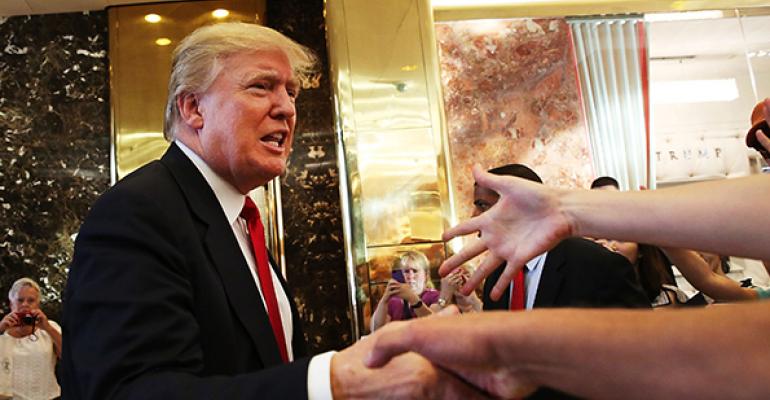With Donald Trump’s announcement of his picks for his administration’s economic advisors should he win the election this November, the spotlight has been put on the industry that first catapulted Trump to fame: commercial real estate.
On the list of advisors revealed this morning were such notable figures as Vornado Realty Trust CEO Steven Roth, Vector Group Ltd. CEO Howard Lorber and, of course, Colony Capital CEO Tom Barrack, who delivered a speech in support of his longtime friend during the Republican National Convention this July.
Trump, however, hasn’t been among the real estate industry’s most favored candidates in this election cycle. The industry as a whole has spent the most money on Ted Cruz, at more than $17.5 million, with Jeb Bush coming in second (at roughly $10.4 million) and Hillary Clinton third (at close to $9.00 million). Trump came in 11th for real estate funds contributed toward his campaign, at only $678,173, while even the less big business-friendly Bernie Sanders brought in $1.06 million.
Although Trump has for years capitalized on his image as a savvy real estate entrepreneur, the truth about his track record in the business is much more complicated. In the 1990s, he almost came to financial ruin as a result of issuing a personal guarantee for $830 million in property loans and was forced to haggle with multiple banks to resolve the situation when his assets underperformed, a mistake that few savvy real estate investors would make today. And according to Tony Schwartz, a ghostwriter who helped Trump write his autobiography “The Art of the Deal,” the Republican Presidential nominee lied prodigiously about how much he paid for his properties, the income those properties were bringing in, how much they were worth and so on.
According to CampaignMoney.com, in 2015 Steve Roth contributed $50,000 directly to the Republican National Committee, while Barrack helped create a pro-Trump super-PAC called Rebuilding America Now. The organization has spent a total of $4.43 million on the 2016 election so far. Among the super-PAC’s most generous contributors? Controversial Los Angeles developer Geoffrey Palmer, who made a $2 million donation, making him the single largest contributor to Trump’s campaign, according to Politico.
These latest developments only highlight how much of a role the nation’s real estate industry plays in who gets elected to public office. Bloomberg reported as long ago as June that Trump was seeking support from many of the country’s real estate bigwigs, with Richard LeFrak and Steve Witkoff reported to attend his fundraising events along with Roth and Lorber.
According to data collected by the Center for Responsive Politics and posted by OpenSecrets.org, real estate-focused PACs have contributed a total of more than $8.5 million so far to this year’s presidential campaign, with 64 percent of the money going to Republican candidates and 36 percent to the Democrats.(That’s up slightly from past election cycles.)
The National Multi Housing Council, the Mortgage Bankers Association, the Real Estate Roundtable, NAIOP Real Estate Development Association, the Appraisal Institute and the Commercial Real Estate Finance Council all contributed money to candidates from both parties.
Some individual companies, on the other hand, appeared to strongly favor Democratic candidates, with Australian REIT Westfield Corp. contributing $7,035 to Democratic candidates, and none to the Republicans. Preit-Rubin Inc., for its part, contributed $10,400 to Democrats and zero to Republicans, and Watson Land Corp. contributed $1,000 to Democrats with no money going to Republicans. Meanwhile, recently formed REIT Forest City Enterprises contributed the same amount to candidates from both parties: $7,500.
Real estate investors have also been active “bundlers.” (Bundlers organize and collect campaign contributions from other donors and deliver the donations en masse. The Clinton campaign released information about bundlers who raised over $100,000.)
Overall, the Clinton campaign identified 39 bundlers associated with the real estate industry that raised $3.9 million.
Westfield’s Peter Lowy is one of the most active bundlers identified by Open Secrets. In all, he’s arranged $600,900 in contributions in all election cycles since 1990. Lightstone Group’s David Lichtenstein and Shiffy Lichtenstein have arranged $306,402 each.

